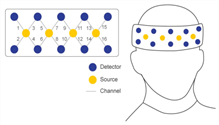HCI Evaluations with fNIRS Brain Sensing
Evaluating the mental demands of tasks and user interfaces is important – good user interfaces should be intuitive, easy to use, and support the user in achieving their tasks.
Measuring mental demand is also highly challenging. Industry relies on research-validated subjective questionnaires that review an entire task retrospectively. To evaluate mental demand during a task has typically involved adding a secondary task that reduces performance on the primary task. If we wanted to take objective measures with brain scanners, however, research has shown that fNIRS is perhaps the most promising technology for natural HCI user studies. You cant use computers in an MRI scanner, and although cheap, EEG is heavily affected by normal body movement. Our research has shown that fNIRS is tolerant of normal body movement, and even talking – where think aloud is a common part of many study protocols. We find that we can set people normal tasks, in a normal HCI environment, and see the difference in mental demands created by different user interfaces for the same task. Our ongoing research has two themes: 1) measuring mental workload in the wild, and 2) delineating mental workload from other cognitive activity like emotion, affect, and stress.

Image credit: Hyosun Kwon
Contact Details
For more information, please contact Max Wilson.
This page was last updated on 10 June 2020 at 10:39 (GMT)